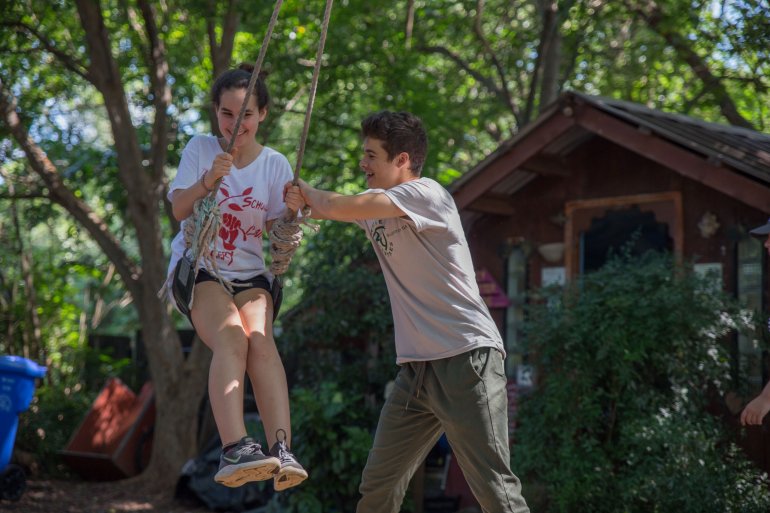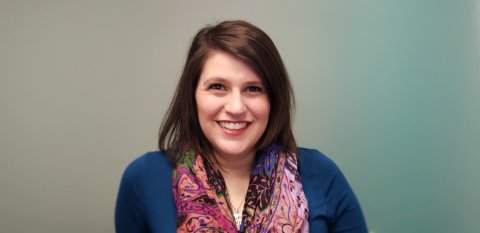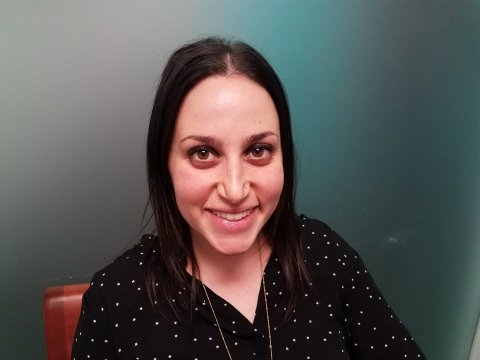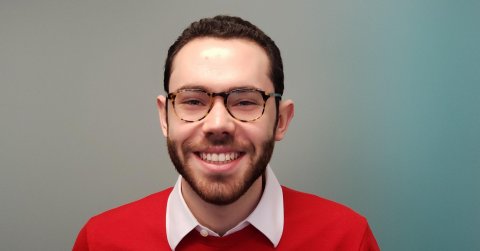Journaling and RICE: How Camp Counselors Mentally Recharge

You just watched your campers say goodbye to their friends as they boarded the bus home at the end of the first session. You’re physically exhausted and mentally drained. A fresh batch of campers is arriving in 48 hours for another session. How do you recharge to give your new campers a summer they won’t forget? The Jewish Education Project staff shares tips for helping camp counselors finish the summer with a flourish.
Journaling
Malka Fleischmann, Director of Knowledge and Ideas and former Rosh Moshava (Head of Staff and Programming), Camp Stone

Being a camp counselor demands the sort of heightened levels of awareness and 24/7 energy output expected of parents. Precious children--usually a dozen or more--are in your care, and you are responsible for their physical, emotional and spiritual well being for the duration of a, however magical, extraordinarily intense 4-8 week session. Your schedule revolves around their daily activities, their waking and sleeping, their nourishment and their enjoyment. So, if you're good at your job, your eyes gaze upon all things external to yourself, always and profoundly focusing on the needs and feelings of your charges.
But what a missed opportunity it would be for a young adult embarking on such a meaningful professional and personal journey to remain unreflective about his own thoughts and feelings, deferring growth-inducing rumination until end-of-session evaluative forms force a hasty and superficial analysis.
Enter journaling.
Every counselor and camp staffer should find time--and be given time--for daily reflection. Whether through a one minute note-to-self or twenty minutes of meandering the halls of one's own mind, journaling forces us to take stock of our experiences, engenders gratitude, produces meditative benefits and allows for real-time self correction. Whatever inevitable growth a counselor might have experienced over the course of a summer, journaling will assuredly enrich and maximize that maturation. It's the exponential factor-- the one that will elevate something fun and challenging to a life-changing, enduring learning within and about the self and about the relationships so thoughtfully and merrily forged amid summer fun.
So, counselors: As you pack your bags for second session, don't forget a notepad and pen!
Be Open To New Experiences
Rebecca Ruberg,Teen Engagement Consultant, Jewish Education and Engagement and former counselor and boating instructor at Camp Monroe

If we were at camp, this would be a unique part of the summer. Visiting day would have just passed, the excitement of the second session campers would have arrived, and we would be ticking our way towards Color War. It is at this point of every summer that Lenny Amdurer, one of the owners and directors of Camp Monroe, would remind the staff during the all-staff meetings of Tuckman’s stages of group development theory- Forming, Storming, Norming and Performing. Specifically, that we were either in the midst of or quickly approaching the “storming stage”, the stage in which both counselors and campers were comfortable in their settings and group dynamics, and therefore more likely to openly share their opinions or assert their roles. This stage is defined by clashes, tension or disagreement. On one hand, we want our staff and campers to feel comfortable voicing their opinions, on the other, sometimes individual identity clashes with that of the collective, and causes conflict. Yet, storming is a critical component of team development, and can only be resolved through accepting individual differences and ideas. It is important to bear in mind the words of Ben Zoma in Pirkei Avot, the Ethics of the Father “Who is wise? One who learns from every person, from all who have taught me I have gained understanding”. When you are feeling challenged, challenge yourself in that moment to shift your perspective and ask yourself what you can learn from this person or situation. Embrace the opportunity to learn and grow and soon enough you will be on your merry way to norming and performing!
“RICE and Shine”
Jodie Goldberg, Teen Engagement Consultant and Project Manager, Jewish Education and Engagement and former Director of Jewish Education at Camp Barney Medintz

During a first aid certification class in preparation for my first year as a counselor, I learned the acronym “RICE” which stands for Rest, Ice, Compress and Elevate. This acronym, which is offered to easily remember the steps of taking care of an injury, I realized it serves more than just physical injuries and can act as a model for emotional and self care. I adopted this model to help me physically and emotionally prepare for the second session of camp.
Rest. Camp can be exhausting. From the swimming pool to the late night camp activity, there is always a reason to stay up late. Use the time between sessions to physically rest by catching up on sleep, and laying low before the start of a new session. Resting between sessions is vital to feeling rejuvenated before camp.
Ice. The ending of a session can leave you feeling a myriad of emotions ranging from sadness, as you just said goodbye to campers, friends and an incredible session to the uncertainty of how another session with play out. Use this time to emotionally cool down by acknowledging how you are feeling. This process will help you feel emotionally ready to show up for your campers and other staff members at the beginning of a new session.
Compress. Time is of the essence between camp sessions. Try to compress as many activities into a short time that will help you prepare for the next session. These activities might include; laundry or buying any last minute items needed for camp or outside trips. This will help you feel ready and prepared to tackle a new session head on.
Elevate. The time between sessions serves as a way to reflect on the session and ask yourself the following questions: “What are the ways in which I can elevate my experience and the experience of my campers for the second session?” and “What are ways I can continue to contribute to camp?” Time to mentally reflect and set goals for the second session will elevate your experience as both a staff member and a member of the camp community.
Self-Care
Josh Schwartz, Administrative Associate, Jewish Education and Engagement and former Rosh Aydah at Camp Yavneh

My first summer as a counselor, staff week felt like being a camper again. I was surrounded by the friends I had gone to camp with; I was in the place that I had been waiting for all year; the summer stretched out before me like a dream. When my campers first arrived, I barely had time to breathe. On my first day, I had to comfort a homesick camper, learn the names of more than fifty kids, and facilitate our opening activity. There was no time for my camp friends anymore so that first summer, I spent all of my free time with them. We had one break period each day, and I spent mine with friends. We slept in the bunk on a rotating schedule, and on my nights off I was out with friends until curfew. I took my days off with friends, going to their parents’ houses and staying up late together.
I was utterly, inexcusably exhausted, increasingly seen with bleary eyes and a cup of coffee in hand. I realized at some point towards the beginning of second session that being a counselor was about balance. I started using some of my breaks to watch TV, my nights off to go to sleep early, my days off to spend languorous mornings in bed with a book. I needed to take time for myself to be able to show up for my campers. I had to learn that camp was no longer about how much fun I was having, but about how much fun I could create for others. Being a counselor is consuming and draining, and I did not have the energy or ability to be a counselor for two months without taking time for myself to rest. Over the course of the summer, I learned that a required part of my job was self-care, and that in making time for self-care, I was ultimately able to be the best version of my counselor self that I could be.


